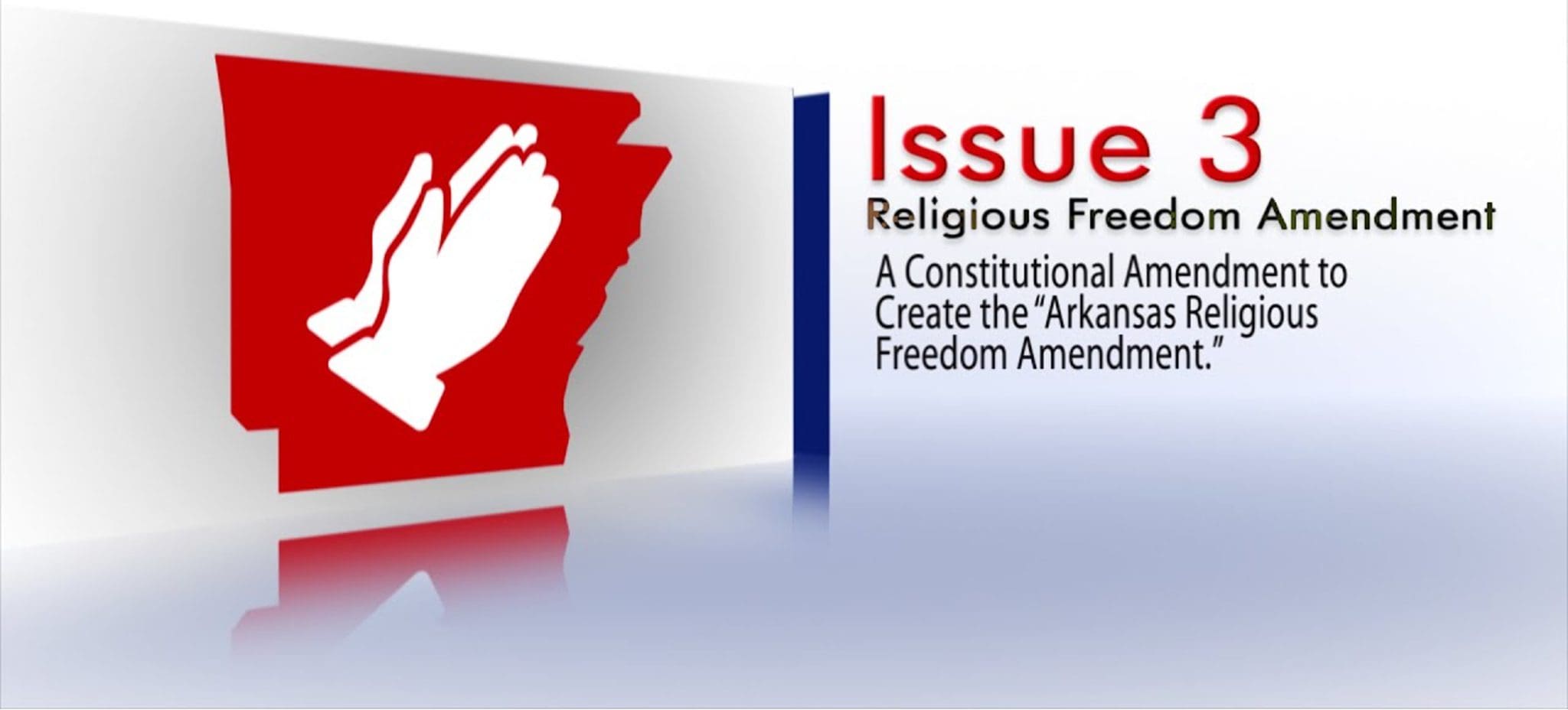
As our church family is studying the upcoming election issues, some have questions regarding the proposed Amendment 3. Thank you for your engagement on these issues! We are working to find additional information to help you.
Below is an analysis from Larry Page. Larry is a lawyer and the Executive Director of the Arkansas Faith & Ethics Counsel. He serves Arkansas Baptists and other christians by helping with issues such as these. Larry’s email address is included in the article and is a good resource as well. We pray this helps as we pray for God’s will to be done during these elections.
ISSUE 3 — THE ARKANSAS RELIGIOUS FREEDOM AMENDMENT
Arkansas Faith & Ethics Council / (501) 837-1688 / llp@ArFaith.org
Issue 3 will be before Arkansas voters in November’s general election. It is a proposed constitutional amendment referred to voters by the state legislature. It is patterned after the federal Religious Freedom Restoration Act enacted in 1993 and Arkansas’ Religious Freedom Restoration Act adopted in 2015.
The following is an attempt to explain it as concisely as possible. Since any discussion of it will necessarily require some references to existing laws, legal principles, and procedures, every effort will be made to avoid getting into the “legal weeds.”
Issue 3’s ballot title describes how it is intended to protect religious liberty should the state’s voters approve it. The ballot title reads, . . .” that government may never burden a person’s freedom of religion except in the rare circumstance that the government demonstrates that application of the burden to the person is in furtherance of a compelling government interest and is the least restrictive means of furthering that compelling government interest.”
There are those who adamantly oppose Issue 3, some of whom include the ACLU, American Atheists, the Freedom from Religion Foundation, the Arkansas Public Policy Panel, and others. There are the supporters of Issue 3, and we would be in that camp. And then there are those who, while they are desirous of stronger protections for religious freedom, are unsure if Issue 3 is the best solution.
Opponents’ main criticisms of Issue 3 are listed below in underlined text. Supporters’ responses to those criticisms of Issue 3 follow in bold text.
I.
Arkansas already has ample religious liberty protection with the state constitution’s Article 2, Section 24 religious protection clause which reads, “No human authority can, in any case or manner whatsoever, control or interfere with the right of conscience; . . . “
It is true that the state constitution seems to prohibit the government from intruding on one’s “right of conscience,” but what does that mean? The phrase “Right of Conscience” is nebulous, open to a variety of interpretations, and lacking any specificity. Neither does it provide any procedural guidelines or set out the prerequisites the state must show to justify the actions it wants to take as Issue 3 will do if voters pass it.
II.
Issue 3 will authorize the government’s intrusion into religious affairs, since it explicitly states that government must demonstrate a compelling state interest to justify imposing a burden on religion.
Government, by virtue of being the government, is already empowered to intrude into religious affairs as well as in a host of other areas, including commerce, education, civil rights, etc. It does not need a specific grant of authority in a constitution to do so.
III.
Issue 3 will not be compatible with the “Right of Conscience” protection scheme currently in the state constitution, and will, in fact, be a hindrance and impediment to the “Right of Conscience” application.
Issue 3 will not constitute a repudiation of the state constitution’s “right of conscience” protection scheme. On the contrary, it will be complimentary, not contrary, to that provision. Furthermore, it will give substance, meaning, and import to the words “right of conscience.” Working in tandem, the “right of conscience” principle and Issue 3’s procedures and standards will only enhance the chances of protecting the religious liberties of Arkansans and their religious institutions, organizations, and churches.
IV.
Arkansas also has a statutory Religious Freedom Restoration Act (RFRA) passed by the state legislature in 2015 that provides adequate religious liberty protection and offers essentially the same kind of standards and remedies that Issue 3 will provide, making Issue 3 unnecessary.
Yes, Arkansas has a statutory RFRA, which is very similar to Issue 3; but by being a statute, it is subject to amendment or repeal by the legislature. When passed by the voters, Issue 3 will be a constitutional amendment not subject to the will of the legislature. It will take a subsequent vote of the people to amend, repeal, or change in any way, rendering it a more fixed and durable religious protection feature.
V.
Issue 3 will permit the religious to discriminate against those individuals, organizations, and lifestyles that they disapprove of.
When alleging that Issue 3 will permit the religious to discriminate against others, the opponents of Issue 3 fail to mention that a court will be the final arbiter. It will not allow the assertion of religious beliefs to discriminate impermissibly against others based on some ill-will, animus, or bias they may feel toward them based on race, ethnicity, religion, or other set of characteristics. It is inconceivable that a court would find that the government lacked a compelling state interest to prohibit such overt and unjust discrimination. This objection is a hollow one indeed.
